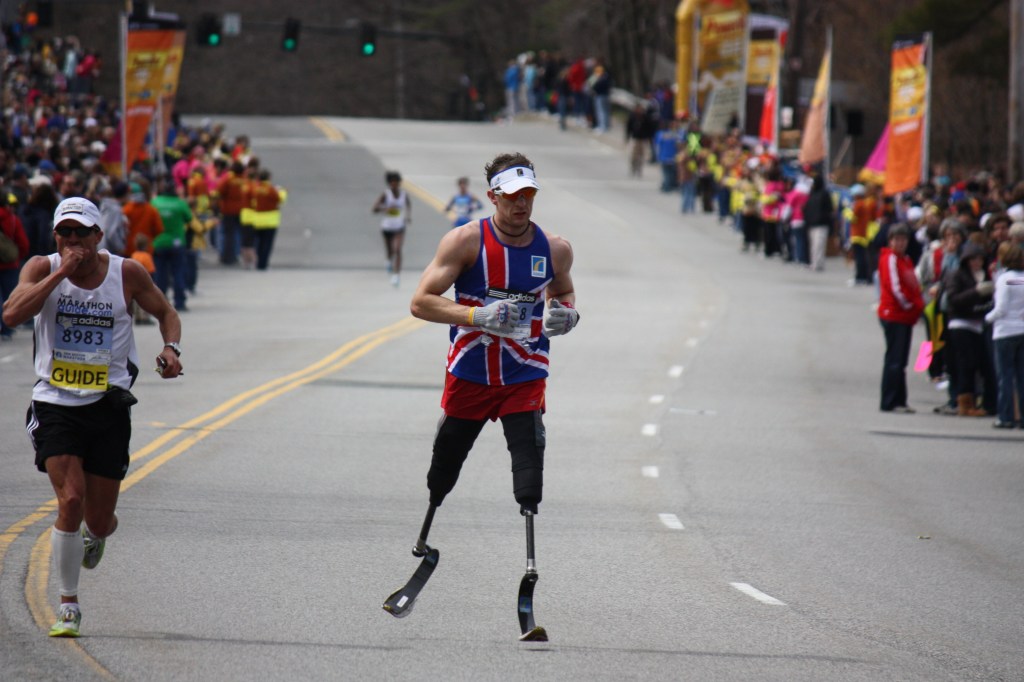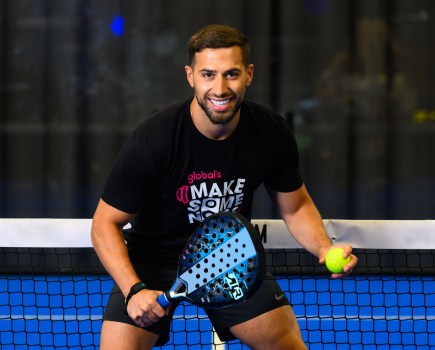Two-time Paralympic Gold medallist and world record holder Richard Whitehead MBE is on a mission to complete 20 marathons in 2025
Two-time Paralympic Gold medallist and world record-holding marathon runner Richard Whitehead MBE is on a mission to complete 20 marathons in 2025, finishing with his 100th in New York.
Born with a double through-knee congenital amputation, Richard, 48, runs with prosthetics and has redefined endurance limits for disabled athletes. Through the new audio running guide: In Bioglan Balance Running Series, Richard shares insights on training, recovery, mindset, and motivation – encouraging a more rounded approach to wellbeing. Speaking to Men’s Fitness, on the eve of the London Marathon he reflected upon on his marathon journey, his evolving strategies, and the power of running to unite and inspire.
Men’s Fitness: You’ve got a packed calendar this year. How are you staying on top of your health while running so many marathons around the world?
Richard Whitehead: The big thing for me is immunity. I’m constantly on planes and trains – this year alone, I’ve already been to America multiple times, to Dubai, and all over Europe. That amount of stress on the body, combined with running 26 miles at a time, can really hammer your system. Supplementation has become key for me. I work with Bioglan on products that support both performance and general wellness. These keep me feeling robust even when the schedule is full-on.

MF: What’s your approach to supplementation as an athlete with a demanding schedule?
RW: It has to be simple and sustainable. You need brands to explain why a certain nutrient matters – say, turmeric for immunity – and how to take it effectively. For someone like me, always on the move, that guidance helps. After a marathon, you’re often in the moment, thinking about the race, and not always about the recovery. But I’ve learned the hard way that if I don’t invest in immune health, I get ill – and once that happens, performance dips fast.
MF: In March you ran the 1908 Olympic Marathon course (Windsor Castle to The White City Stadium). That’s a deep dive into history. What drew you to that?
RW: I wanted my marathons to be about more than just locations or times. The 1908 course from Windsor to London is iconic, and running it was a way of connecting with the roots of the sport. It’s very different from the big-city races – 50,000 people pounding the streets – but it reminded me that running is the most inclusive sport there is. It doesn’t matter if you finish in two hours or seven, you’re part of a community, and along the way, you inspire people just by showing up and sharing that space.
MF: You’re also doing all this at 48 years old. Has your training had to evolve over the years?
RW: Absolutely. I started out with gymnastics and swimming before transitioning to track sprinting and then long-distance running. Each shift required a different physical focus. These days, it’s all about those marginal gains – the one-percent improvements. I’ve worked with sports scientists at Loughborough and Nottingham, doing VO2 max testing, lactic threshold assessments, the whole works. Nutrition, sleep, strength – everything is more precise now.
MF: How has your recovery routine changed with age and marathon volume?
RW: Recovery is now as important as the training itself. I ran Boston last week, London is next up, and Vancouver is after that. So, recovery is about being smart. I sleep more, eat better, stretch regularly, and use saunas. I used to do ice baths and even cryotherapy when I was sprinting, but now I just use cold water straight from the tap – enough to help without shocking the system. The biggest thing is listening to your body. I don’t follow a rigid plan anymore. Instead, I’ve developed a personal recovery model that adapts with age and experience.

MF: Do you ever hit a wall, psychologically? What keeps you going when the next marathon looms large?
RW: Every athlete has moments where motivation dips. But it comes down to your “why”. For some people, it’s a gold medal or a personal best. For me, it’s always been about showing what’s possible – demonstrating that disability isn’t a barrier, and that sport is a platform for connection and change. When I wake up tired, or my legs ache, I remember that. I know I’m doing something that might inspire someone else to start their own journey.
MF: Is that why you say running is more than just a number or a time?
RW: Exactly. It’s cliché to talk about the journey, but for me, it really is about learning through movement. Running has dominated my life, but it’s also enriched it. Whether I’ve been chasing world records or just chatting with someone mid-race, it’s always about connection – across ability, background, belief. Sport, at its best, brings people together. That’s what keeps me lacing up.
Quickfire: Richard Whitehead on training & life
- First marathon? New York City, November 2, 2004. I said I’d never do another. Now I’m closing in on 100.
- Favourite recovery hack? Listening to your body. No strict schedule – just flexibility and consistency.
- Next big goal? My 100th marathon – 20 years to the day after my first.
- One rule to train by? Surround yourself with people who believe in your journey.
Richard Whitehead MBE has partnered with supplement brand Bioglan for their fourth series of ‘In Bioglan Balance’ to show how he finds balance in his busy life @bioglansupplements







